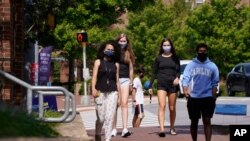President Donald Trump on Wednesday blasted universities that have canceled in-person classes amid coronavirus outbreaks, saying the move could ultimately cost lives rather than saving them.
Raising the issue at a White House news briefing, Trump said the virus is akin to the seasonal flu for college students and that students pose a greater safety threat at home with older family members than on college campuses. He cited no evidence to support either contention, and the White House did not respond to a request for information on what Trump based his remarks.
Health experts have said the novel coronavirus appears to be deadlier than the seasonal flu — initial data suggest a far higher mortality — and it is more easily transmitted. Another major difference: There is no vaccine for the novel coronavirus while there is a vaccine for the seasonal flu.
"It's significantly safer for students to live with other young people than to go home and spread the virus to older Americans," Trump said.
Most college students are 18 and older and thus considered adults, who are more susceptible to coronavirus illnesses than children. While older adults face greater risks from COVID-19, the Centers for Disease Control and Prevention reported last month that otherwise healthy young adults can experience lingering symptoms, including cough, fatigue and body aches, for two to three weeks.
Campuses face unique challenges in keeping students safe and responding to outbreaks, including providing adequate facilities for placing infected or possibly infected students in quarantine. A paper posted recently on JAMA Network, a website of the American Medical Association, concluded that containing COVID-19 on a campus would require frequent testing of students, social distancing and other behavioral interventions, and other strategies.
Trump's comments follow recent suspensions of in-person instruction at the University of North Carolina at Chapel Hill and at the University of Notre Dame. UNC announced Monday that, after a surge in cases during the first week of classes, all undergraduate courses would shift online. A day later, Notre Dame canceled campus classes for two weeks amid a sharp increase in cases.
Those schools' struggles have prompted some other colleges to backtrack on plans for campus classes. Michigan State University told students Tuesday to stay at home for the fall term, citing rising virus cases and the recent experiences of "other institutions."
Clusters of cases at UNC, Notre Dame and elsewhere have been tied to off-campus parties, in some cases at fraternity houses. In his comments Wednesday, Trump did not address health risks tied to students' off-campus behavior.
Trump has said for weeks that schools and colleges must reopen and that they can do so safely. He has threatened to cut funding to schools that don't reopen, and he threatened to revoke schools' and colleges' tax-exempt status. The White House says schools are key to the nation's economic recovery, and Trump has said students need to be in school and on campus to learn.
"There's nothing like campus. There's nothing like being with the teacher as opposed to being on a computer board," Trump said Wednesday.
He said there are simple measures universities can take to open safely. "Students who feel sick should not attend class and should limit social interaction, as they would for any other illness," he said. "Universities should implement measures to protect the high-risk students or professors."
Some colleges, however, say the risks of reopening are too great. In announcing plans to keep classes online this fall, Ithaca College's president on Tuesday said the crisis has "continued to evolve in unpredictable ways."
"It is easy to foresee the likelihood of a public health trajectory that would mandate the closure of the college due to circumstances beyond our control," President Shirley Collado said in a campus letter. "Bringing students here, only to send them back home, would cause unnecessary disruption in the continuity of their academic experience."




